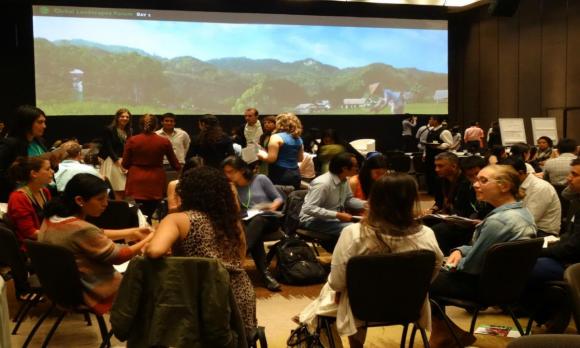
Young Professionals for Agricultural Development (YPARD) identifies as an international movement and network of young professionals for young professionals, for agricultural development. YPARD emphasizes the importance of youth-to-youth empowerment, which manifests in its organizational structure. The organization provides a platform for information sharing and dissemination, as well as online and offline meetings and events.

Young Professionals for Agricultural Development (YPARD) identifies as an international movement and network of young professionals for young professionals, for agricultural development. YPARD emphasizes the importance of youth-to-youth empowerment, which manifests in its organizational structure. The organization provides a platform for information sharing and dissemination, as well as online and offline meetings and events.
Food Tank had the opportunity to speak with Marina Cherbonnier, web and communications manager, at YPARD.
Food Tank (FT): How do you contribute to creating a better food system?
Marina Cherbonnier (MC): YPARD is engaging young professionals across the agricultural sector to discuss and share information and thoughts about the future they want and the role they (want to) undertake towards sustainable livelihoods without depleting our environment. At the heart of YPARD are its members, who are encouraged to take an active role and to initiate activities relevant to young professionals in their local context. Indeed, there is no sustainable future without the full engagement of the new generation.
FT: What is a project, program, or result you are most proud of?
MC: The CGIAR Research Programs (CRPs) are major activities in the international agricultural sector, yet have little focus on youth or next generation engagement. YPARD has been actively pursuing discussions with CRP leaders and the Consortium to raise the profile of youth engagement and look for tangible activities on the ground. YPARD was invited to key meetings to provide its input to strategies. A YPARD staff member and the Steering Committee (SC) Chair were invited and funded by the consortium office to do a presentation at the CRP leaders meeting in Montpellier, France on how YPARD can work with the CRPs. YPARD contributed to the Dryland Systems youth strategy development, the first among the CRPs. YPARD also provided input in the CGIAR capacity development strategy and the Strategic Results Framework. We are further preparing more advocacy and planning in the next year, for greater representation of youth as both beneficiaries of and part of planning and development in the CRPs.
FT: What are your goals for this year and beyond?
MC: Our key focus for 2015 is to launch and build a steady ground for the YPARD mentoring program. We are also working on strengthening our regional representations and capacity development of YPARD representatives as national youth leaders. We will continue to generate more opportunities, information, networking, and value for our members.
FT: In one sentence, what is the most important thing eaters and consumers can do today to support a more sustainable food system?
MC: Eaters and consumers need to understand the value of farmers’ work and fully recognize their profession.
FT: How can individuals become more involved in your organization?
MC: Young professionals and their supporters are encouraged to register on the website and to join us on social media. Write your story, a blog post, or shoot a short video, apply for an opportunity, or get involved with our national teams for better positioning of young people in their national agricultural context.
Download the 2015 Good Food Org Guide HERE.
The James Beard Foundation and Food Tank, along with a prestigious advisory group of food system experts, developed the Good Food Org Guide. This definitive Guide highlighted nonprofit organizations that are doing exemplary work in the United States in the areas of food and agriculture, nutrition and health, hunger and obesity, and food justice.
This post was orginally published on the Food Tank Website.

